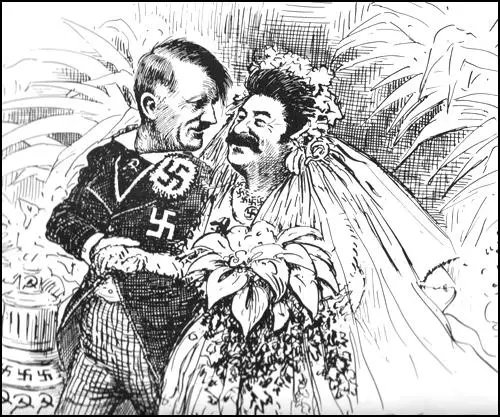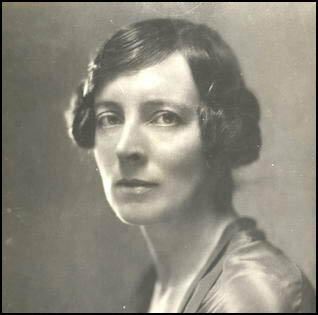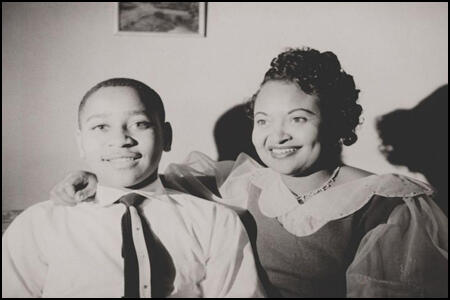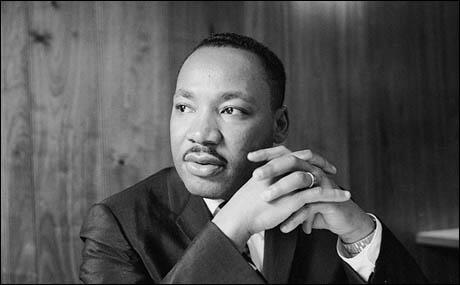On this day on 28th August
On this day in 1939, the Nazi-Soviet Pact was signed in Moscow. It was reported: "Late Sunday night - not the usual time for such announcements - the Soviet Government revealed a pact, not with Great Britain, not with France, but with Germany. Germany would give the Soviet Union seven-year 5% credits amounting to 200,000,000 marks ($80.000,000) for German machinery and armaments, would buy from the Soviet Union 180,000.000 marks' worth ($72,000,000) of wheat, timber, iron ore, petroleum in the next two years".Apparently, the day after the agreement was signed, Stalin told Lavrenti Beria: "Of course, it's all a game to see who can fool whom. I know what Hitler's up to. He thinks he's outsmarted me, but actually it's I who have tricked him."
Under the terms of the agreement, both countries promised to remain neutral if either country became involved in a war. The cartoonist, David Low, who had long campaigned for an alliance with the Soviet Union, wrote: "Britain and France were dragged to war under such uninspiring and disadvantageous circumstances that it seemed hardly possible for them to win. What a situation! In gloomy wrath at missed opportunity and human stupidity I drew the bitterest cartoon of my life, Rendezvous, the meeting of the 'Enemy of the People' with the 'Scum of the Earth' in the smoking ruins of Poland."
Walter Krivitsky, whose predictions had proved correct, argued in The New Leader: "Not only are the American people shocked, but far more the unhappy masses of Germany and Russia who have paid and will continue to pay for this triumph with their blood. Such master strokes are eloquent proof of the return by the totalitarian states to the darkest phases of secret diplomacy such as characterized the epoch of Absolutism... For the democratic world the importance of the pact lies in that it has finally ripped the mask from Stalin's face. I believe that in those countries where the free word still exists, the master stroke of diplomacy is the death stroke of Stalinism as an active force. I believe this because after nearly 20 years of service for the Soviet government, I am convinced that democracy; despite its present perilous position, is the sole path for progressive humanity."
Nikita Khrushchev was involved in the negotiations with Joachim von Ribbentrop. He later explained why Stalin was willing to reach an agreement with Hitler. "I believe the Ribbentrop-Molotov Pact of 1939 was historically inevitable, given the circumstances of the time, and that in the final analysis it was profitable for the Soviet Union. It was like a gambit in chess: if we hadn't made that move, the war would have started earlier, much to our disadvantage. It was very hard for us - as Communists, as anti-fascists - to accept the idea of joining forces with Germany. It was difficult enough for us to accept the paradox ourselves."

On this day in 1931 Mary Hamilton, the Labour Party MP, writes a letter to Ramsay MacDonald attacking the idea of a National Government. "But greatly as I admire your courage, and ready as I am to believe your gesture may have saved us all, I could not, as I thought the whole situation out on my long journey home, find it possible to support this Government or believe in its policy. It is a very hard decision to make; and this afternoon's party meeting does not make it agreeable to act on - but, there it is. I felt I must write this line to express the deep regret I feel about this, temporary severance between you and the party."

On this day in 1955 14 year old Emmett Till was murdered. Emmett had been sent by his mother to visit relatives near Money, Mississippi. Emmett stayed at the home of his uncle, Moses Wright. During the evening of 24th August, Emmett, Simeon Wright, and a group of his friends, went to Bryant's Grocery Store. Carolyn Bryant later claimed that Emmett had grabbed her at the waist and asked her for a date. When pulled away by his cousin, Emmett allegedly said, "Bye, baby" and "wolf whistled".
Wright later commented: "I think Emmett wanted to get a laugh out of us or something. He was always joking around, and it was hard to tell when he was serious.... Well, it scared us half to death. You know, we were almost in shock. We couldn't get out of there fast enough, because we had never heard of anything like that before. A black boy whistling at a white woman? In Mississippi? No."
Carolyn Bryant told her husband, Roy Bryant, about the incident and he decided to punish the boy for his actions. The following Saturday, Roy Bryant and his half-brother, John W. Milam, took him from the home of Moses Wright and drove him to "a barn, beat and lynched him. They dragged his body to the Tallahatchie River, shot him in the head, tied him with barbed wire to a massive metal cotton gin fan, and shoved his body into the water."
After Emmett's body was found Bryant and Milam were charged with murder. On 19th September, 1955, the trial began in a segregated courthouse in Sumner, Mississippi. Joseph Wilson Kellum was their defence attorney. He later recalled that he believed the men when they denied that they had murdered Till. During the trial he told the jury that their forefathers would turn over in their graves if they convicted any white man for killing a black man. "I was trying to say something that would meet with - where they would agree with me, you see. Because I was employed to defend those fellas. And I was going to defend them as much as I could and stay within the law."
In court Moses Wright identified Bryant and Milam as the two men who took away his nephew on the 24th August. Moses pleaded with the men to leave Emmett alone. "He's only 14, he's from up North. Why not give the boy a whipping, and leave it at that?" His wife Elizabeth Wright offered money to the intruders, but they ordered her to go back to bed. Milam, at 6 feet two inches and 235 pounds, turned to Moses and threatened him. "How old are you, preacher?" Wright said that he was 64. "If you make any trouble, you'll never live to be 65."
Other African Americans also gave evidence against Bryant and Milam but after four days of testimony the all white jury took just 67 minutes to return a not-guilty verdict. "One of the jurors said they would have returned earlier if they had not stopped for a soda." After the trial Moses Wright, fearing what would happen to him if he remained in Mississippi, moved to Chicago.
Richard Rubin interviewed one of the jurors, Ray Tribble, many years after the trial. Rubin asked him why he found the men not guilty. He agreed with Kellum that the whole event had been staged by the National Association for the Advancement of Colored People and that Emmett Till was still alive. "He explained, quite simply, that he had concurred with the defense team's core argument: that the body fished out of the Tallahatchie River was not that of Emmett Till - who was, they claimed, still very much alive and hiding out in Chicago or Detroit or somewhere else up North - but someone else's, a corpse planted there by the NAACP for the express purpose of stirring up a racial tornado that would tear through Sumner, and through all of Mississippi, and through the rest of the South, for that matter." Rubin pointed out Emmett Till's own mother identified the body of her son? Tribble replied: "That body had hair on its chest... and everybody knows that "blacks don't grow hair on their chest until they get to be about 30."

On this day in 1963 Martin Luther King makes I Have a Dream speech at March on Washington for Jobs and Freedom.
I am happy to join with you today in what will go down in history as the greatest demonstration for freedom in the history of our nation.
Five score years ago, a great American, in whose symbolic shadow we stand today, signed the Emancipation Proclamation. This momentous decree came as a great beacon light of hope to millions of Negro slaves who had been seared in the flames of withering injustice. It came as a joyous daybreak to end the long night of their captivity.
But one hundred years later, the Negro still is not free. One hundred years later, the life of the Negro is still sadly crippled by the manacles of segregation and the chains of discrimination. One hundred years later, the Negro lives on a lonely island of poverty in the midst of a vast ocean of material prosperity. One hundred years later, the Negro is still languished in the corners of American society and finds himself an exile in his own land. And so we’ve come here today to dramatize a shameful condition.
In a sense we've come to our nation’s capital to cash a check. When the architects of our republic wrote the magnificent words of the Constitution and the Declaration of Independence, they were signing a promissory note to which every American was to fall heir. This note was a promise that all men, yes, black men as well as white men, would be guaranteed the "unalienable Rights of Life, Liberty, and the pursuit of Happiness." It is obvious today that America has defaulted on this promissory note insofar as her citizens of color are concerned. Instead of honoring this sacred obligation, America has given the Negro people a bad check, a check which has come back marked "insufficient funds."
But we refuse to believe that the bank of justice is bankrupt. We refuse to believe that there are insufficient funds in the great vaults of opportunity of this nation. And so we’ve come to cash this check, a check that will give us upon demand the riches of freedom and the security of justice.
We have also come to this hallowed spot to remind America of the fierce urgency of now. This is no time to engage in the luxury of cooling off or to take the tranquilizing drug of gradualism. Now is the time to make real the promises of democracy. Now is the time to rise from the dark and desolate valley of segregation to the sunlit path of racial justice. Now is the time to lift our nation from the quicksands of racial injustice to the solid rock of brotherhood. Now is the time to make justice a reality for all of God’s children.
It would be fatal for the nation to overlook the urgency of the moment. This sweltering summer of the Negro’s legitimate discontent will not pass until there is an invigorating autumn of freedom and equality. Nineteen sixty-three is not an end, but a beginning. And those who hope that the Negro needed to blow off steam and will now be content will have a rude awakening if the nation returns to business as usual. [Applause] There will be neither rest nor tranquillity in America until the Negro is granted his citizenship rights. The whirlwinds of revolt will continue to shake the foundations of our nation until the bright day of justice emerges.
But there is something that I must say to my people, who stand on the warm threshold which leads into the palace of justice: in the process of gaining our rightful place, we must not be guilty of wrongful deeds. Let us not seek to satisfy our thirst for freedom by drinking from the cup of bitterness and hatred. [Applause] We must forever conduct our struggle on the high plane of dignity and discipline. We must not allow our creative protest to degenerate into physical violence. Again and again, we must rise to the majestic heights of meeting physical force with soul force. The marvelous new militancy which has engulfed the Negro community must not lead us to a distrust of all white people, for many of our white brothers, as evidenced by their presence here today, have come to realize that their destiny is tied up with our destiny. And they have come to realize that their freedom is inextricably bound to our freedom. We cannot walk alone.
And as we walk, we must make the pledge that we shall always march ahead. We cannot turn back. There are those who are asking the devotees of civil rights, "When will you be satisfied?"
We can never be satisfied as long as the Negro is the victim of the unspeakable horrors of police brutality. We can never be satisfied as long as our bodies, heavy with the fatigue of travel, cannot gain lodging in the motels of the highways and the hotels of the cities. We cannot be satisfied as long as the Negro’s basic mobility is from a smaller ghetto to a larger one. We can never be satisfied as long as our children are stripped of their selfhood and robbed of their dignity by signs stating "for whites only." We cannot be satisfied as long as a Negro in Mississippi cannot vote and a Negro in New York believes he has nothing for which to vote. No, no, we are not satisfied and we will not be satisfied until justice rolls down like waters and righteousness like a mighty stream.
I am not unmindful that some of you have come here out of great trials and tribulations. Some of you have come fresh from narrow jail cells. Some of you have come from areas where your quest for freedom left you battered by the storms of persecution and staggered by the winds of police brutality. You have been the veterans of creative suffering. Continue to work with the faith that unearned suffering is redemptive. Go back to Mississippi, go back to Alabama, go back to South Carolina, go back to Georgia, go back to Louisiana, go back to the slums and ghettos of our northern cities, knowing that somehow this situation can and will be changed. Let us not wallow in the valley of despair.
I say to you today, my friends, so even though we face the difficulties of today and tomorrow, I still have a dream. It is a dream deeply rooted in the American dream.
I have a dream that one day this nation will rise up and live out the true meaning of its creed: "We hold these truths to be self-evident, that all men are created equal."
I have a dream that one day on the red hills of Georgia, the sons of former slaves and the sons of former slave owners will be able to sit down together at the table of brotherhood.
I have a dream that one day even the state of Mississippi, a state sweltering with the heat of injustice, sweltering with the heat of oppression, will be transformed into an oasis of freedom and justice.
I have a dream that my four little children will one day live in a nation where they will not be judged by the color of their skin but by the content of their character. I have a dream today.
I have a dream that one day down in Alabama, with its vicious racists, with its governor having his lips dripping with the words of "interposition" and "nullification," one day right there in Alabama little black boys and black girls will be able to join hands with little white boys and white girls as sisters and brothers. I have a dream today.
I have a dream that one day every valley shall be exalted, every hill and mountain shall be made low, the rough places will be made plain, and the crooked places will be made straight, and the glory of the Lord shall be revealed, and all flesh shall see it together.
This is our hope. This is the faith that I go back to the South with. With this faith we will be able to hew out of the mountain of despair a stone of hope. With this faith we will be able to transform the jangling discords of our nation into a beautiful symphony of brotherhood. With this faith we will be able to work together, to pray together, to struggle together, to go to jail together, to stand up for freedom together, knowing that we will be free one day. This will be the day, this will be the day when all of God’s children will be able to sing with new meaning:
My country, ’tis of thee, sweet land of liberty, of thee I sing.
Land where my fathers died, land of the pilgrim’s pride,
From every mountainside, let freedom ring!
And if America is to be a great nation, this must become true.
So let freedom ring from the prodigious hilltops of New Hampshire.
Let freedom ring from the mighty mountains of New York.
Let freedom ring from the heightening Alleghenies of Pennsylvania.
Let freedom ring from the snow-capped Rockies of Colorado.
Let freedom ring from the curvaceous slopes of California.
But not only that: Let freedom ring from Stone Mountain of Georgia.
Let freedom ring from Lookout Mountain of Tennessee.
Let freedom ring from every hill and molehill of Mississippi.
From every mountainside, let freedom ring.
And when this happens, when we allow freedom ring, when we let it ring from every village and every hamlet, from every state and every city, we will be able to speed up that day when all of God’s children, black men and white men, Jews and Gentiles, Protestants and Catholics, will be able to join hands and sing in the words of the old Negro spiritual: Free at last! Free at last! Thank God Almighty, we are free at last!


